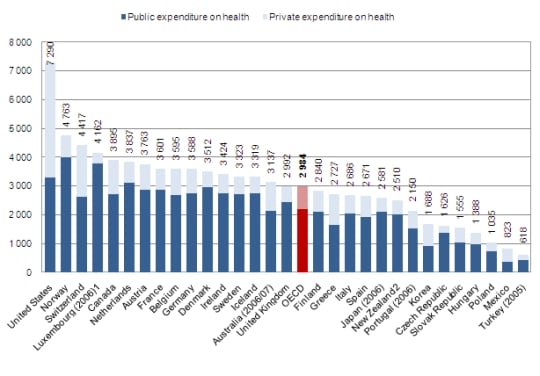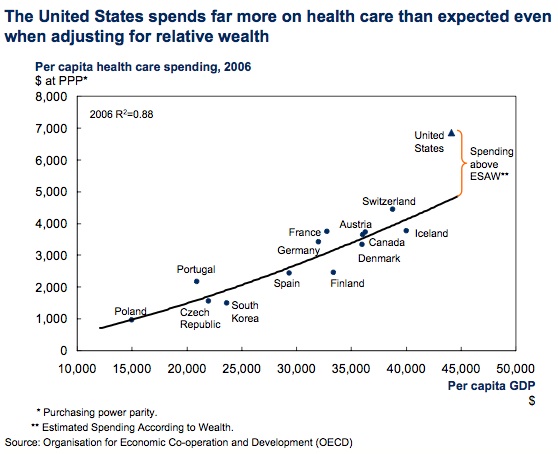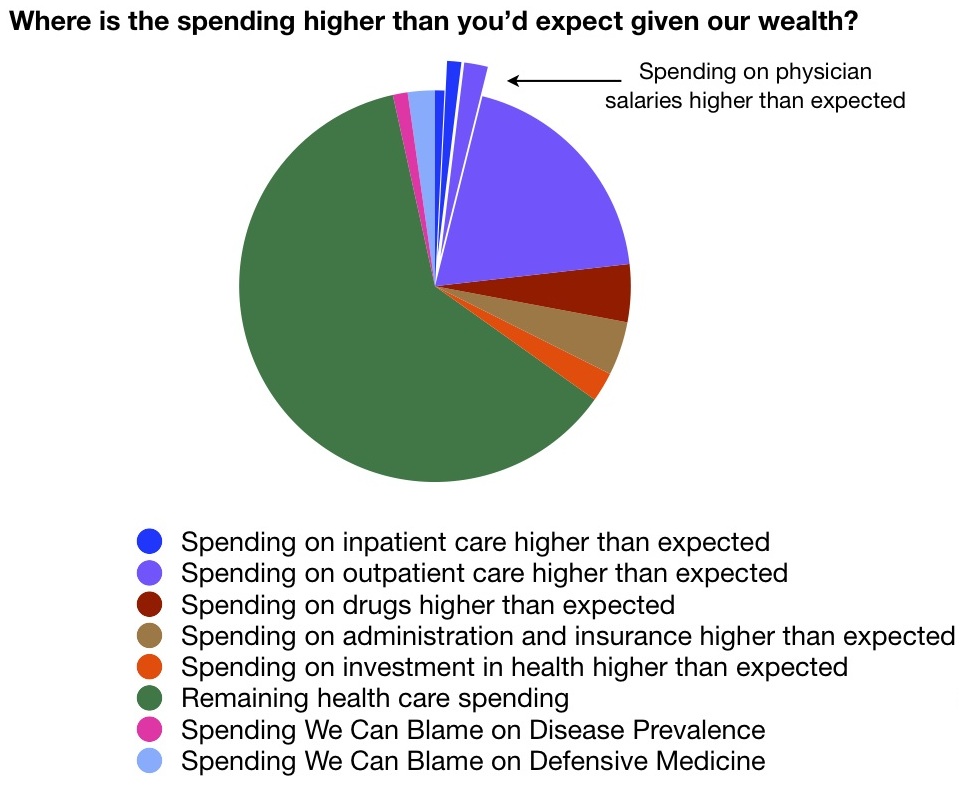Presenter brings up an interesting point. Why is our public percapita expenditure for health higher than nations that have nationalized health care when Americans don't?

Moderator: Global Moderator


Yes all of those...but according to the short video the 800 pound gorilla is lack of leverage in negotiation of prices. This leverage is what gives Walmart a big advantage over a mom and pop store when buying things. In nationalized healthcare systems this is where the bulk of the cost savings come from.MediumTex wrote: Fraud, inefficiency, U.S. consumers of health care subsiding international drug development, high cost of liability insurance, doing unnecessary diagnostic procedures, doctors prescribing expensive drugs when cheaper drugs are available, and spending a lot on end of life care.
Those are a few things that increase costs.
You can call it leverage but I call it coercion. In many of the other countries you are not allowed to practice medicine outside of the systemdoodle wrote:Yes all of those...but according to the short video the 800 pound gorilla is lack of leverage in negotiation of prices. This leverage is what gives Walmart a big advantage over a mom and pop store when buying things. In nationalized healthcare systems this is where the bulk of the cost savings come from.MediumTex wrote: Fraud, inefficiency, U.S. consumers of health care subsiding international drug development, high cost of liability insurance, doing unnecessary diagnostic procedures, doctors prescribing expensive drugs when cheaper drugs are available, and spending a lot on end of life care.
Those are a few things that increase costs.

Right, because those systems haven't generally fixed most of the other problems. They address the symptoms with mandates, price caps, and other things like that, and it works well enough for two or three decades until the systems get totally bogged down.doodle wrote: In nationalized healthcare systems this is where the bulk of the cost savings come from.


AMEN!! Very nice summary.MediumTex wrote: Those are a few things that increase costs.
Wow. Excellent post. We are doomed.WiseOne wrote: Let's get some definitions down... <snip rest of great post>
WiseOne, if you look at the pie chart it seems like all of these barely account for 30% of higher costs. It's that mysterious green chunk that we should focus on.WiseOne wrote: Let's get some definitions down...
Fraud: that's the label stuck on doctors' inability to remember the insanely complicated rules for how much to bill for a given service. Such as: 14 point review of systems (13 is not enough and would constitute fraud), full specialty exam must include e.g. funduscopy even if it's not relevant for the clinical situation, 3 "medical decision-making" points, 4 history points, and on and on. And you will still make mistakes unless you take into account your patient's insurance - it's different for Medicare vs private insurance. Better hope your doctor doesn't remember all this stuff, because if they do then it's unlikely they're focusing on what you WANT them to focus on, i.e. taking care of you! Incidentally, "physician salaries" are actually "medical reimbursements to physicians", which covers a TON of overhead such as....
inefficiency: See above. Note that the whole "fraud" scene requires armies of billing/coding experts, compliance oversight, "online training", etc. Those people's salaries, offices etc are all 100% overhead that contributes nothing to your care. And don't even get me started on the millions that have been thrown at horribly inefficient EHR systems.
U.S. consumers of health care subsiding international drug development: YES. Big item.
high cost of liability insurance: lawyers are an expensive hobby :-)
doing unnecessary diagnostic procedures: yes, because reimbursements for face to face patient time aren't enough to pay expenses, so people "play the game" by substituting procedures for good old fashioned thinking and history-taking. The EHR systems and ICD9 coding system push you in that direction as well, by taking far more physician time and forcing big cuts to patient time, and forcing everything into code-shaped boxes which then are tied to iron-clad "care guidelines".
doctors prescribing expensive drugs when cheaper drugs are available: Yes. Banning drug reps from physician offices would instantly solve the problem, not that it's likely to happen since the pharm companies have a pretty strong lobby going.
and spending a lot on end of life care: Yes, big item. I get really incensed whenever I see things like an 89 year old with metastatic lung cancer in an ICU. Which by the way I did not make up...saw that case yesterday.
AMEN!! Very nice summary.MediumTex wrote: Those are a few things that increase costs.
CMS, i.e. Medicare and Medicaid. Every time there is a perceived problem, the rules get more complicated. It's about to happen again, with the advent of ICD10. I look forward to finding out what happened to my very favorite ICD9 code, the one for death by guillotine. I suspect a lot of motivation comes from health care administrators trying to protect/expand their jobs.TennPaGa wrote: I'm curious about some of these things:
Who set up these systems? What did they used to be? When did they change to the monstrosities you describe?WiseOne wrote: insanely complicated rules for how much to bill for a given service. Such as: 14 point review of systems (13 is not enough and would constitute fraud), full specialty exam must include e.g. funduscopy even if it's not relevant for the clinical situation, 3 "medical decision-making" points, 4 history points, and on and on.
The EHR systems and ICD9 coding system push you in that direction as well, by taking far more physician time and forcing big cuts to patient time, and forcing everything into code-shaped boxes which then are tied to iron-clad "care guidelines".

Some like the EHR and meaningful use/PQRI code requirements, but not all. Private insurance companies tend to follow Medicare's lead. Going to cash-only is the only way to really avoid this stuff, but it has its own pitfalls. There was an interesting article in CNN about this recently. It's a great trend if it continues, because for minor & preventative care, the free market would be the best arbiter. It might even have a positive impact on government-funded "disaster" care (see recent thread about having single payer government insurance with very high deductible - still think that's a fantastic idea).Pointedstick wrote: Can you avoid all that nonsense by not taking Medicare and Medicaid patients? Or do the insurance companies impose their own separate hell on you as well?

Who is paying for this? Is she paying? Is an insurance company she paid premiums to paying for this?WiseOne wrote: I get really incensed whenever I see things like an 89 year old with metastatic lung cancer in an ICU. Which by the way I did not make up...saw that case yesterday.
Why do insurance companies let doctors get away with cutting into the insurance companies profits? Are they just dumb? Is it too expensive to request that doctors use cheap generics instead of high-priced drugs?WiseOne wrote: doctors doing unnecessary diagnostic procedures
doctors prescribing expensive drugs when cheaper drugs are available

It has been my experience that insurance companies do dispute and refuse to pay unnecessary diagnostic services - and then the bill is sent to me. The last one cost me about $1100 for various vitamin deficiency screenings on a blood test that I had no idea the doctor even asked for.Kshartle wrote: Can insurance companies not dispute unnecessary diagnostics successfully? Why have no insurance companies been able to figure this out? You'd think they would profit immensely.
Lack of leverage in negotiating...maybe. Doctors can charge what they want and then just refuse to accept insurance from a company that tries to pay less than that. If the government was the only insurer, there would be a lot more negotiating leverage I would think.Kshartle wrote:Why do insurance companies let doctors get away with cutting into the insurance companies profits? Are they just dumb? Is it too expensive to request that doctors use cheap generics instead of high-priced drugs?WiseOne wrote: doctors doing unnecessary diagnostic procedures
doctors prescribing expensive drugs when cheaper drugs are available
Can insurance companies not dispute unnecessary diagnostics successfully? Why have no insurance companies been able to figure this out? You'd think they would profit immensely.
Have you ever comunicated back to the doctor's office that you are now on the hook for what they perscribed? You can't be alone. Why are doctors getting away with this?notsheigetz wrote:It has been my experience that insurance companies do dispute and refuse to pay unnecessary diagnostic services - and then the bill is sent to me. The last one cost me about $1100 for various vitamin deficiency screenings on a blood test that I had no idea the doctor even asked for.Kshartle wrote: Can insurance companies not dispute unnecessary diagnostics successfully? Why have no insurance companies been able to figure this out? You'd think they would profit immensely.
This is why I choose to stay away from the system until I'm having a near death experience.
If the doctor refuses someone's insurance wouldn't that cut into their profits because they're losing patients? How could an individual doctor or even a group or hospital have more leverage than an insurance company?doodle wrote:Lack of leverage in negotiating...maybe. Doctors can charge what they want and then just refuse to accept insurance from a company that tries to pay less than that. If the government was the only insurer, there would be a lot more negotiating leverage I would think.Kshartle wrote:Why do insurance companies let doctors get away with cutting into the insurance companies profits? Are they just dumb? Is it too expensive to request that doctors use cheap generics instead of high-priced drugs?WiseOne wrote: doctors doing unnecessary diagnostic procedures
doctors prescribing expensive drugs when cheaper drugs are available
Can insurance companies not dispute unnecessary diagnostics successfully? Why have no insurance companies been able to figure this out? You'd think they would profit immensely.
I don't see the point of private insurers actually. It seems to complicate the system enormously.

Did you end up paying it? Did you complain to the doctor? Are doctor's just tricking people?rhymenocerous wrote: I don't have anything particularly insightful to contribute, but I thought I'd just share an anecdote. A few years ago, my company switched health care providers and I was switched from a plan without a deductible to one with a deductible. Previously, I had never come into contact with what health care costs. I had bronchitis a few months later and the doctor asked me to blow into this tube which made a little graph on the computer. Somehow, I messed it up the first time, so he asked me to try again. Later when I received the bill, I was charged $80 for each time I blew into that stupid tube! If the doctor had told me at the time what it would actually cost, I would have declined.

I did pay the bill, but I complained to the doctor, telling him that I was covering this out of pocket and he lowered the total for me. I guess that he just bills everything he possibly can to the insurance company, but he was willing to work with me when I asked. I got the bill instead of my insurance company because I had not yet met my deductible for the year (a minimum amount of health-related expenses that I have to cover before insurance picks up the tab). As soon as I could, I switched back to a health plan at work without a deductible. I didn't think to ask the doctor the cost at the time. I've heard stories though of people who try to find out the price of an operation or something beforehand from a hospital and it's almost impossible because there are so many moving parts and in-the-moment decisions that are made.Kshartle wrote: Did you end up paying it? Did you complain to the doctor? Are doctor's just tricking people?
Why did you get a bill and not the insurance company? Did you not ask the doctor if the test had a cost and if not why not?
I'm definately not trying to be hard on you, I'm just wondering why this stuff is happening. I've gone to the doctor maybe one or twice in the last 15 years and it was very minor so I don't ever encounter this.